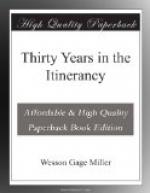Summerfield was just in the midst of her financial embarrassment. The indebtedness was about fifteen thousand dollars, and threatened to overwhelm the charge. But the good brethren were steadfast, and through great labor and sacrifice, aided by Rev. S.C. Thomas, succeeded in meeting their obligations. Brother Wilson rendered effective service, but at the close of the year returned to his home in Ohio.
Rev. J.C. Robbins was appointed this year to the Spring Street Station. Brother Robbins entered the North Indiana Conference in 1844. His appointments were Winchester, Plymouth, Clinton, Hagerstown, Williamsburg, Knightstown, Doublin and Lewisville. He was transferred to the Wisconsin Conference in 1855, and stationed at North Ward, Fond du Lac. His subsequent appointments were Waupun, Berlin and Empire. The year opened finely, and during the winter Brother Robbins held a protracted meeting, which resulted in the conversion of many souls. But the Society met with a severe loss this year, in the destruction of their Church by fire.
Brother Robbins remained a second year at Spring Street, and again enjoyed a good revival. After leaving the city, he has been stationed at Racine, Waukesha, Sheboygan Falls, Waupun, Berlin, Green Bay, Hart Prairie, Sharon and Footville. At the present writing, he is at the last named place, seeking to gather sheaves for the Master.
This year intense excitement prevailed throughout the country. The Presidential election, which placed Abraham Lincoln at the head of our national affairs, occurred in November. And during the following months, the rebellion was taking form in the Southern States, but did not culminate in open rupture until the middle of April. But before stating the position of the Conference and Church in the pending struggle, it will be proper to refer to the causes which produced the conflict.
In the settlement of the United States, two distinct types of society planted themselves in the two great centres of the Atlantic Coast. The one made New England the theater of development, and the other the Eastern cordon of the Southern States. From the first center, the population moved westward through New York, Pennsylvania, and the Prairie States, to the Mississippi. From the other, the settlements extended through the savannahs of the South to the Gulf.
The emigrants in the North were mainly those who came to the Western world to find an asylum from the religious persecutions to which they had been subjected at home. In the South, society was largely established under the sanctions of royalty. These two facts will account for the radical differences existing between the people of the two sections. In the North, society very naturally accepted the political doctrines of personal equality and universal freedom. In the South, the people as naturally adhered to their aristocratic ideas, and held to the doctrine of privileged classes.




